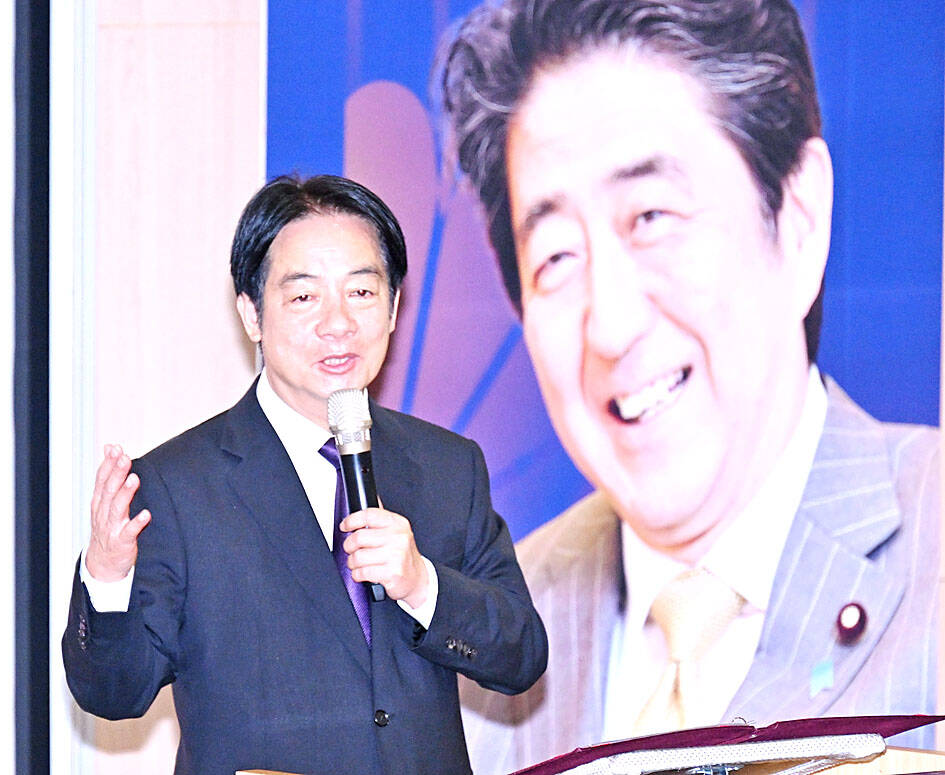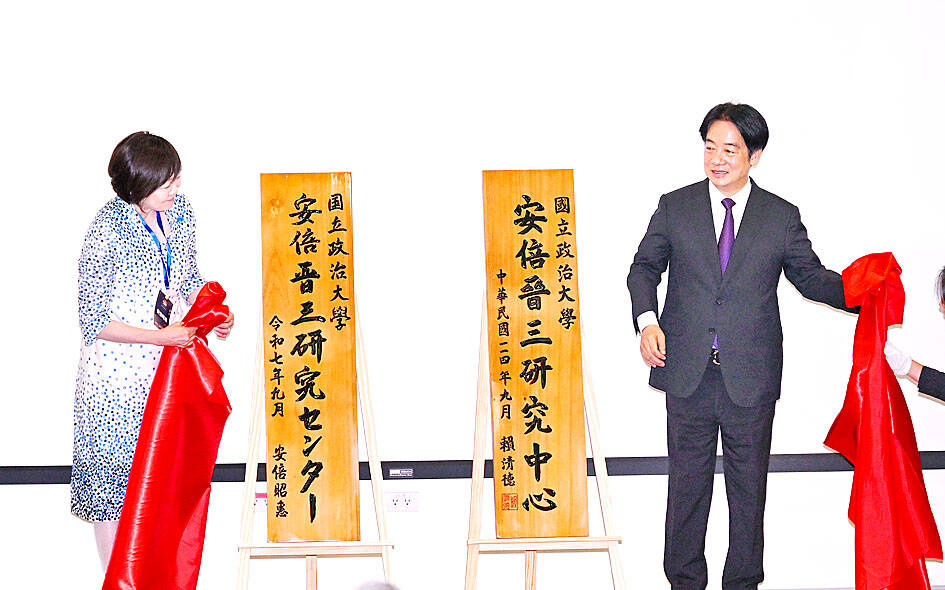President William Lai (賴清德) yesterday lauded the establishment of a research center in Taipei named after late Japanese prime minister Shinzo Abe as an important platform for developing Taiwan-Japan cooperation.
Speaking during the opening ceremony of the research center at National Chengchi University’s (NCCU) College of International Affairs in Taipei, Lai said Abe, the longest-serving prime minister in Japanese history, was not only a great politician, but also a close friend of Taiwan.
Following the Tainan and Hualien earthquakes in 2017 and 2018 respectively, Abe not only expressed condolences to Taiwanese, but also offered help in post-disaster relief and rebuilding, Lai said.

President William Lai speaks at an inauguration ceremony for a research center named after the late Japanese prime minister Shinzo Abe at National Chengchi University’s College of International Affairs in Taipei yesterday.
Photo: Fang Pin-chao, Taipei Times
After stepping down as prime minister in September 2020, Abe promoted the idea that “a Taiwan contingency is a contingency for Japan,” against the backdrop of increased Chinese military pressure on Taiwan.
Abe was a visionary, Lai said, adding that when Abe noticed that China’s defense budget was increasing year by year, which would inevitably threaten the peace and stability of the Indo-Pacific region, Abe flew to the US to meet with US President Donald Trump before the latter’s first term began and explained the Indo-Pacific situation, which led to the idea of a free and open Indo-Pacific region.
The idea was later adopted by the US and its allies, leading to the formation of the Quadrilateral Security Dialogue, or Quad, between Japan, the US, Australia and India, Lai said.

President William Lai, right, and late Japanese prime minister Shinzo Abe’s widow, Akie Abe, unveil the plaques at an inauguration ceremony for a research center named after Shinzo Abe at National Chengchi University’s College of International Affairs in Taipei yesterday.
Photo: Fang Pin-chao, Taipei Times
“We have Abe’s foresight to thank for the peace we are enjoying in Taiwan now, rather than war,” Lai said.
When Trump withdrew the US from the Trans-Pacific Partnership, it was Abe who took on the responsibility and led Indo-Pacific nations to promote its successor, the Comprehensive and Progressive Agreement for Trans-Pacific Partnership, he said.
Abe valued not only the bilateral relationship or point-to-point connections between countries, but also a diplomatic strategy that looked at international relations from a global perspective, Lai said, adding that Abe worked to advance foreign relations with a broader view, which also earned Japan further recognition from the international community.
Abe also proposed a highly visionary semiconductor strategy, he said.
The Japan Semiconductor Strategy Members’ Alliance, established by former Japanese minister of economy, trade and industry Akira Amari, successfully facilitated Taiwan Semiconductor Manufacturing Co’s (台積電) investment in Japan, Lai said.
Taiwan and Japan can cooperate further in the semiconductor industry, he added.
Abe’s death was not only a loss for Japan and Taiwan, but for the whole world, he said.
The opening of the research center coincided with Abe’s birthday on Sept. 21, which is also designated the International Day of Peace by the UN, he said, expressing hope that the center would cultivate talent, and promote the study of Abe’s ideals and policies, and become an important cooperation platform between the two countries.
Joining the ceremony in Taipei yesterday was Abe’s widow, Akie Abe, who expressed gratitude to Taiwan and NCCU for establishing the center in her late husband’s name.
Although not a politician herself, Akie Abe said she came to better understand her husband’s ideals after his passing.
She said that she hoped to continue fostering the cordial exchanges between Taiwan and Japan that flourished under his leadership, so that his legacy could be carried forward by future generations.
Shinzo Abe was fatally shot with a makeshift shotgun during an election campaign event in Nara, Japan, on July 8, 2022. He was 67. He served as Japan’s prime minister in 2006 and 2007, and again from 2012 to 2020.
Lai, then-vice president, attended Shinzo Abe’s wake in Tokyo.
In an article published by the Los Angeles Times a few months before his death, Shinzo Abe urged the US to abandon its long-standing policy of “strategic ambiguity” toward Taiwan, under which Washington has not committed to sending troops in the event of a Chinese invasion.
However, his nationalist policies also made him a controversial figure in Japanese politics.
One major controversy arose in 2015, when his government revised security legislation to allow the overseas deployment of Japanese troops for combat missions, a move that led to protests at home.
Source: Taipei Times - 2025/09/22




















